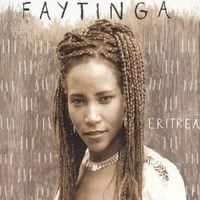 Faytinga, one of Eritrea's best known singers, is a member of the Kunama tribe. Her mother was of Blen descent (a Cushitic speaking people) from the highlands, while her father was a member of the Semitic speaking Tigrinya peoples. She was born in 1964, and was involved in Eiretrea's struggle for independence from Ethiopia since she was 14 years of age. Faytinga's father, Faïïd Tinga, was a war hero and was already a part Eritrea's 30 year liberation struggle at Faytinga's birth.
Faytinga, one of Eritrea's best known singers, is a member of the Kunama tribe. Her mother was of Blen descent (a Cushitic speaking people) from the highlands, while her father was a member of the Semitic speaking Tigrinya peoples. She was born in 1964, and was involved in Eiretrea's struggle for independence from Ethiopia since she was 14 years of age. Faytinga's father, Faïïd Tinga, was a war hero and was already a part Eritrea's 30 year liberation struggle at Faytinga's birth.As a young child, she was often surrounded by music and wished to become a singer. This first started to happen when she began to perform for the soldiers on the frontlines. Faytinga draws upon the musical traditions of Eritrea for her inspiration, using the Krar (a form of lyre, used also in Ethiopia), the bass Krar, the Wata (a traditional one stringed violin/fiddle of which there are many varieties all over Africa) and Bengala (a Kunama Eritrean stringed instrument). While she bases her music on traditional Kunama music, she also uses contemporary instruments, incorporates the guitar and modern percussion in her music.
In 1990, Faytinga took part of an American tour and Europe as a member of an Eritrean musical group and didn't tour as a solo artist until 1995 when she recorded her first album on cassette. After an appearance at the Africolor festival in 1999 she recorded her first CD in 2000. In addition to being a singer, she is also known to be an elegant dancer and represents a source an inspiration to many Eritreans. She sings in Kanama, a Nilo-Saharan language that is over 8,000 years old, and among the oldest languages used in the Horn of Africa. The ancient Meroitic language of Cush (Nubia region of the Nile Valley) has often been classified as a Nilo-Saharan language by many scholars, due in part to the Sudanese origins of some Nilo-Saharan languages such as the Luo family of related ethnic groups (tribes).
Faytinga incorporates the verses of Eritrean poets like Agostino Egidio and Arodi Tulli in her music and has used traditional Kunama songs to remain true to her roots. Her clear, ethereal voice virtually transports you to another world, and her music - drawing upon the musical traditions of her people - creates a uniquely Eritrean East African sound that has established her as one of the shining lights in African music.
Listen to Faytinga on Kemet Music Radio
Discography:
Album: Numey
Label: Africolor/Cobalt
Year: 2000
Album: Faytinga
Label: Africolor/Cobalt
Year: 2003

No comments:
Post a Comment